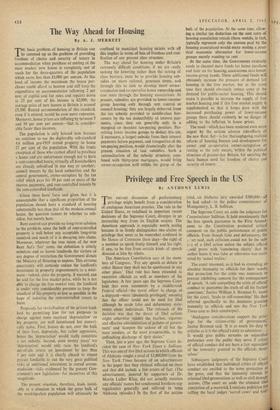The Way Ahead for Housing
By A. J. MERRETT
THE basic problem. of housing in Britain can be summed up as the problem of providing freedom of choice and security of tenure in accommodation when purchase or renting of the most modest new house is completely out of reach for the three-quarters of the population which, earns less than £1,000 per annum. At this level of income the maximum the house pur- chaser could afford to borrow and still keep his expenditure on accommodation (allowing 2 per cent of capital cost for rates and repairs) down to 25 per cent of his income is £2,000; the average price of new houses in Britain is around £3,500. Rented accommodation of this standard, even if it existed, would be even more expensive. Moreover, house prices are inflating by between 7 and 10 per cent per annum—that is, consider- ably faster than incomes.
The population is only housed now because we continue to use the deplorably sub-standard 4.6 million pre-1919 rented property to house 27 per cent of the population. With the ironic exception of those who cannot afford to purchase a house and are unfortunate enough not to have a rent-controlled house, virtually all householders are already subsidised in one way or another: council tenants by the local authorities and the central government, owner-occupiers by the tax relief which pays for 30 per cent or more of the interest payments, and rent-controlled tenants by the rent-controlled landlords.
Given these basic facts and given that it is unacceptable that a significant proportion of the population should have a standard of housing substantially less than that of the modern council house, the question cannot be whether to sub- sidise, but merely how.
Rent control can provide no long-term solution to the problem, since the bulk of rent-controlled property is well below any acceptable long-term standard and much of it is decaying into slums. Moreover, whatever the true intent of the new Rent Act's 'fair' rents, the definition, is utterly nebulous and so leaves landlords the victims of any degree of restriction the Government directs the Ministry of Housing to impose. This extreme uncertainty will certainly reduce the landlord's investment in property improvements to a mini- mum —indeed, since the property, if vacated, can be sold for the free market price, while he is not able to charge the free market rent, the landlord is under very considerable pressure to keep the standard of his property as law as possible in the hope of inducing the rent-controlled tenant to leave.
Proposals for revitalisation of the private land- lord by permitting him for tax purposes to charge against rents received 'depreciation' on his property, are well intentioned but numeri- cally naive. First, houses do not, over the bulk of their lives, depreciate, but rather appreciate, hence the 'depreciation' would really constitute a tax subsidy. Second, even twenty years' tax 'depreciation' would only raise the landlord's net-of-tax return on investment by less than 1 per cent ai1.1 it is clearly absurd to expect private landlords to run the very great political risks of additional investment in rented accom- modation—risks evidenced by the present Gov- ernment's new legislation—for incentives of this magnitude.
The present situation, therefore, leads inevit- ably to a situation in which the great bulk of the working-class population will ultimately be confined to municipal housing estates with all this implies in terms of loss of freedom and ossi- fication of our present class structure,
The way ahead for housing under Britain's extremely difficult conditions, if we are really seeking the lowering rather than the raising of class barriers, must be to provide housing sub- sidies on more rational, generous terms, add through this to seek to develop more owner- occupation and co-operative house ownership and cost rents .through the housing associations. At present, subsidies are provided to lower-income- group housing only through rent control or council housing; they are. largely deharred from the tax subsidy provided to middle-class bor- rowers by the tax deductibility of interest pay- ments, since they are generally only in a marginal or insecure tax-paying position. Per- mitting lower income groups to deduct this (or, if necessary, a larger) subsidy from their interest payments before payment, and irrespective of the tax-paying position, would dramatically alter the present situation of tied subsidies. Such a rationalisation of the subsidy structure, com- bined with thirty-year mortgages, would bring owner-occupation well within the grasp of the
bulk of the population. At the same time, allow- ing a similar tax deduction on the cost rents of housing association rentals (these rentals, in fact, typically represent only the interest paid by the housing association) would make renting a prac- tical economic alternative for lower-income groups merely wanting to rent At the same time, the Government evidently needs to channel more funds tor house purchase and later on for housing associations-into lower- income-group hands. These additional funds will obviously increase the pressure of demand for housing in the free market, but at the same time they should obviously reduce some of the demand for public-sector housing. This should make it possible to increase the supply of free market housing and if this free market supply is supplemented so that it keeps pace with the increased purchasing power of lower-income groups there should evidently be no danger of adding to the inflation in house prices.
The need—which has been rendered even more urgent by the serious adverse side-effects of the new Rent Act—is for thoroughgoing realistic reform of housing finance and development for owner and co-operative owner-occupation or renting as the only means, within the political structure of present-day Britain. for securing the basic human need for freedom of choice and security of tenure.






































 Previous page
Previous page